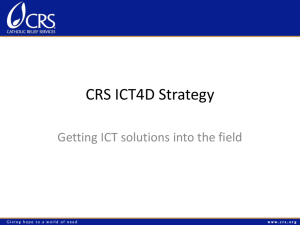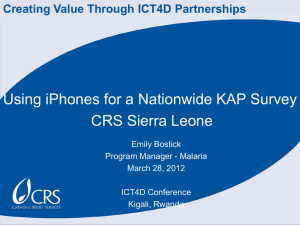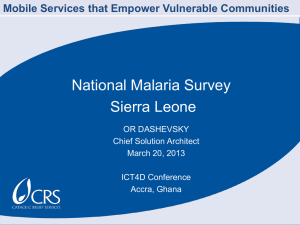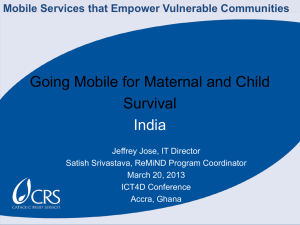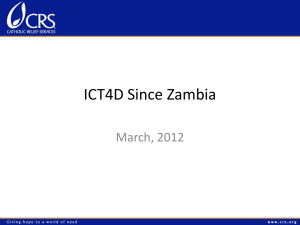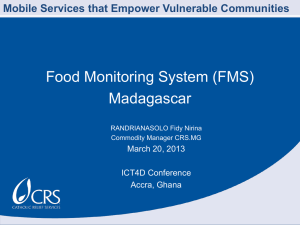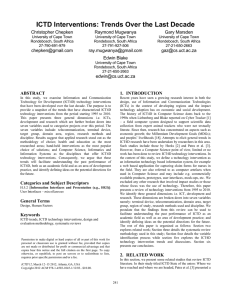Beyond Failure: Owning your Story
advertisement
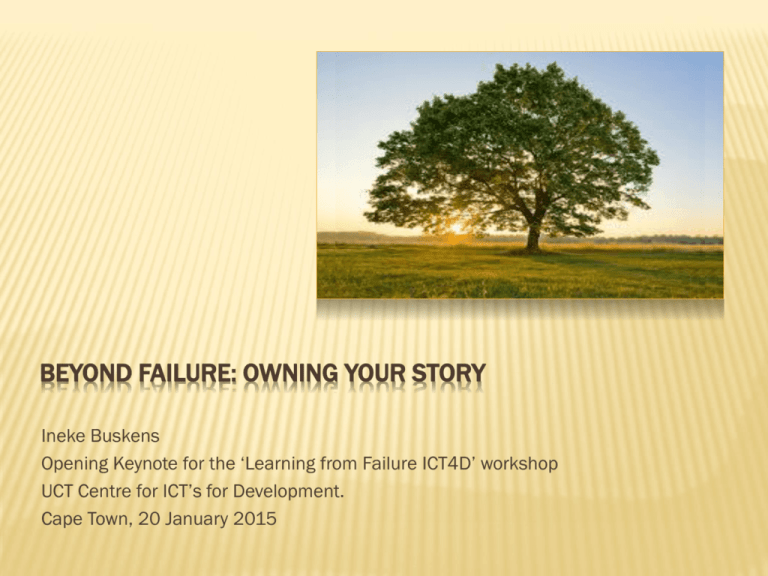
BEYOND FAILURE: OWNING YOUR STORY Ineke Buskens Opening Keynote for the ‘Learning from Failure ICT4D’ workshop UCT Centre for ICT’s for Development. Cape Town, 20 January 2015 PRESENTATION OUTLINE Purpose of this talk What is development? An appropriate frame of mind for ICT4D Research? Definitions of failure and their implications Failure as ‘failure to excel in a research project’ Owning our story as methodological prerequisite Nurturing subjectivity, individuality and uniqueness Caveat: Can we really see ourselves? What it takes: truth, courage and humility Concluding Remarks PURPOSE OF THIS TALK To contribute to the methodological discourse in the field of ICT4D research in order to optimise researchers’ capacity to make life better for people who would normally be excluded from the Information Society’s benefits. Why is this important? Participating in research conversations on the basis of ones research, either validates the underlying assumptions as to how research should be done, or it challenges them and offers an alternative. I think that the concept of failure resonates with and strengthens an understanding of ICT4D research that is not conducive to get the best out of researchers, research situations and methods. Failure in ICT4D research has been a very popular and entertaining endeavour: it allowed researchers to speak truthfully about their research processes, but I think we can do better than that….hence the title beyond failure… WHAT IS DEVELOPMENT? Economic growth? Development of ICT sector and/or products Freedom: enhancement of capabilities? Enhancement of choice? Participation in the Information Society / Networked Society? Buen Vivir? Conscious Evolution? Natural Unfolding like trees for instance? ……….. ………… AN APPROPRIATE FRAME OF MIND FOR ICT4D RESEARCH? What does the field of ICT4D need? Agile technology, participatory design…all iterative processes, very bounded to context and the personalities, intentions of the specific role players When ICT4D is understood as a form of normative social science and as a form of research for social change, the following points need to be considered: Truth claim has to be pragmatic. Theory development has to support the purpose of change. Research designs should ideally be iterative, allowing for and supporting the change process, not to fall into the theory-praxis gap. Researchers have to (be trained to) be comfortable with participating in emergent processes, be able to cope with unexpected events and be equipped to give meaning to unfolding processes that are relevant to the particular purpose of the research. DEFINITIONS OF FAILURE AND THEIR IMPLICATIONS Definitions: a. Omission of occurrence or performance; a state of inability to perform a normal function or an abrupt cessation of normal functioning; a fracturing or giving way under stress. b Lack of success; a failing in business. c A falling short: deficiency; deterioration, decay. d One that has failed (adapted from Free Merriam-Webster Dictionary- http:// www.merriam-webster.com/dictionary/failure) Implications: 1) This definition exemplifies a frame of mind where expectations and requirements are known and where it is accepted as logical, normal and natural that these expectations and requirements are met and where the power structure underlying these expectations and requirements is not questioned. 2) Use of the denotation of failure will inevitably evoke emotions of unworthiness and shame when it will shift from denoting the lack of doing, to a lack of being (shame is about not being good enough). FAILURE AS ‘FAILURE TO EXCEL IN A RESEARCH PROJECT’ Excellence as doing justice to the object of study: Truth: validity and reliability Usefulness / Relevance Ethical / righteousness Recognisability (Buskens 2001) Failure as ‘failure to excel in a research project’: Failure to do what needs to be done in the process of constructing truthful, useful, ethical knowledge (data collection, analysis, interpretation and reporting) about or with the object of study and represent this knowledge in a way that is recognisable to peers (for review), to clients (for use) and to communities of knowledge for transferring the research learning to other contexts and incorporating it into existing bodies of knowledge. OWNING YOUR STORY AS METHODOLOGICAL PREREQUISITE Given the emergent nature of ICT4D research, research excellence thus depends on the way in which researchers are able to share their research learning beyond the expectations they may have started with. They have to be able to tell their story ‘beyond failure and success’. In order to do justice to their research learning they have to be able to tell their own narrative about it: they have to ‘own their story’. Owning ones story has two main dimensions: 1) The capacity to ‘know ones self’ in the context of the research process. This ‘knowing’ is grounded in an understanding of ones personal context and history, of the way in which the research purpose and process fit into the ‘project of one’s life and the capacity to integrate the unfolding understanding of these changes in ones understanding of self and of the research process and results. 2) The capacity to engage in critical dialogue (purpose aligned discourse grounded in open-heartedness, open-mindedness, good will and mutual trust and respect - Smaling 2008) in the research language that is current in ones field. NURTURING SUBJECTIVITY, INDIVIDUALITY AND UNIQUENESS The interpretation of ‘what needs to be done’ and hence the way in which an ‘object of study can be done justice to’ is determined by subjective choice. Reality is complex and it can be known and changed, in many different ways. Even when a fixed research protocol is used (following convention as accepted by a certain research community), applying that protocol is a choice, i.e. a subjective decision. Human beings are individual and unique, hence researchers’ choices may differ even when research question and research process seem similar. Questions of validity, reliability, trustworthiness and ethics may be answered differently by different individuals and yet those answers could, in all their diversity all be genuine, true and legitimate. Regardless whether a fixed research protocol is adopted or whether the research process is allowed to emerge iteratively in alignment with purpose, documenting the rationale and process of research choices is a subjective endeavour. Research discourse (and research education) has to honour and nurture subjectivity, individuality and uniqueness. CAVEAT: CAN WE REALLY SEE OURSELVES? In order to create the opportunity for researcher excellence to emerge and mature, it seems we need to let go of the concept of failure and the mind set it is embedded in and stands for. However, there will be resistance to such a stance because of the fallibility of human knowledge and definitely when that knowledge has to include knowledge of the self. In order to own our story, we have to really see ourselves. Is that possible? Confirmation bias, cognitive dissonance are accepted realities. The more intelligent and creative people are, the more they can fool themselves. How do we protect ourselves and each other from such ‘bias’? WHAT IT TAKES…..TRUTH, COURAGE AND HUMILITY There are always the facts: Congruence as marker. Dialogical Inter-subjectivity with the shared agreement on a purpose guiding the processes of awareness and dialogue. Beware / raise alarm when the story is too coherent In research for change, researchers change too. Human beings are complex, have many aspects and are always in a process of de-fragmentation: a research for social change like ICT4D processes ideally would be, will accelerate and intensify internal in-coherence in both researchers and participants. Without this creative chaos, no newness would be able to emerge, but that means that the human beings involved have to hold their identity ‘lightly’. Commitment for the truth is paramount, more important than loyalty towards people, places, things, times and event. Such commitment to truth requires courage and humility and such personal growth is a never ending process. CONCLUDING REMARKS So how personal does it get? It has become clear that the more open researchers can be about themselves yourself, (grounded in awareness), and the more open - minded and open hearted in dialogue, the better they can share what there is to learn with all their knowledge communities. Maybe all the talk about failure is so attractive because it creates the space not only for the emergent and unpredictable nature of research processes but also because it acknowledges the uniqueness, individuality and subjectivity of researchers. Admitting and sharing failure could be grounded in a defiance of the ‘protocol’ (the subtext of the unexamined and unquestioned mainstream paradigm) and hence a cry for freedom and a demand for the opportunity to deliver excellence. But just defying the protocol is not doing us, our intentions and efforts justice.
